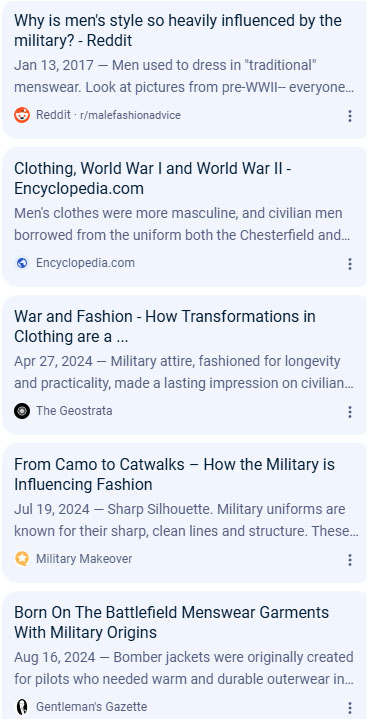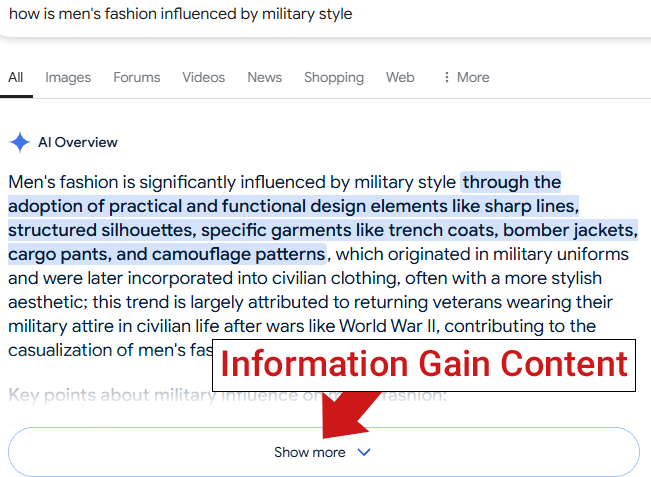New research on AI Overviews and organic search results presents a fresh view on how AIO is evolving and suggests how to consider it for purposes of SEO.
Among the findings:
- Their research showed that the AIO they were tracking showed more volatility than the organic search results, that they were changing at a faster rate.
- AIO volatility doesn’t correlate with organic search volatility
- They conclude that AIO is replacing featured snippets or “enhancing search results.”
- It was also concluded that, for the purpose of SEO, AIO should be considered as something separate from the organic search.
- Generative text changed for every query they looked at.
That last finding was really interesting and here is what they said about that:
“As far as I can tell, the generative text changed for every single query. However, our measure was looking for meaningful changes in the generative text which might reflect that Google had shifted the intent of the original query slightly to return different generative ranking pages.”
Another interesting insight was a caveat about search volatility is that it shouldn’t be taken as a sign of a Google update because it could be the influence of current events temporarily changing the meaning of a search query, which is related to Google’s freshness algorithm. I don’t know who the Authoritas people are but hats off to them, that’s a reasonable take on search volatility.
You can read the AIO research report here, it’s very long, so set aside at least 20 minutes to read it:
AIO Independence From Organic SERPs
That research published by Authoritas got me thinking about AIO, particularly the part about the AIO independence from the search results.
My thoughts on that finding is that there may be two reasons why AIO and organic SERPs are somewhat decoupled:
- AIO is tuned to summarize answers to complex queries with data from multiple websites, stitching them together from disparate sources to create a precise long-form answer.
- Organic search results offer answers that are topically relevant but not precise, not in the same way that AIO is precise.
Those are important distinctions. They explain why organic and AIO search results change independently. They are on independent parallel paths.
Those insights are helpful for making sense of how AIO fits into overall marketing and SEO strategies. Wrap your head around the insight that AIO and Organic Search do different and complementary things and AIO will seem less scary and become easier to focus on.
A complex query is something AIO can do better than the regular organic search results. An example of a complex question is asking “how” a general concept like men’s fashion is influenced by an unrelated factor like military clothing. Organic search falls short because Google’s organic ranking algorithm generally identifies a topically relevant answer and this kind of question demands a precise answer which may not necessarily exist on a single website.
What Is A Complex Query?
If complex queries trigger AI Overviews, where is the line? It’s hard to say because the line is moving. Google’s AIO are constantly changing. A short TL/DR answer could arguably be that adding a word like what or how can make a query trigger an AIO.
Example Of A Complex Query
Here’s the query:
“How is men’s fashion influenced by military style?”
Here’s the AIO answer that’s a summary based on information combined from from multiple websites:
“Men’s fashion is significantly influenced by military style through the adoption of practical and functional design elements like sharp lines, structured silhouettes, specific garments like trench coats, bomber jackets, cargo pants, and camouflage patterns, which originated in military uniforms and were later incorporated into civilian clothing, often with a more stylish aesthetic; this trend is largely attributed to returning veterans wearing their military attire in civilian life after wars, contributing to a more casual clothing culture.”
Here are the completely different websites and topics that AIO pulled that answer from:
Screenshot Of AIO Citations

The organic search results contain search results that are relevant to the topic (topically relevant), but don’t necessarily answer the question.
See also: AI Overviews Data Shows Massive Changes In Search Results
Information Gain Example
An interesting feature of AI Overviews is delivered through a feature that’s explained in a Google Patent on Information Gain. The patent is explicitly in the context of AI Assistants and AI Search. It’s about anticipating the need for additional information beyond the answer to a question. So in the example of “how is men’s fashion influenced by military style” there is a feature to show more information.
Screenshot Showing Information Gain Feature

The information gain section contains follow-up topics about:
- Clean lines and structured fit
- Functional design
- Iconic examples of military clothing
- Camouflage patterns
- Post-war impact (how wars influenced what men after they returned home)
How To SEO For AIO?
I think it’s somewhat pointless to try to rank for information gain because what’s a main keyword and what’s a follow up question? They’re going to switch back and forth. Like, someone may query Google about the influence of camouflage patterns and one of the information gain follow-up questions may be about the influence of military clothing on camouflage.
The better way to think about AIO, which was suggested by the Authoritas study, is to just think about AIO as a search feature (which is what they literally are) and optimize for that in the same way one optimized for featured snippets, which in a nutshell is to create content that is concise and precise.
Watch also:
- Mastering AI Overviews For Greater Search Visibility
- AI-Organized SERPs & Overviews: How To Win Visibility In The New Landscape Of SEO
Featured Image by Shutterstock/Sozina Kseniia





